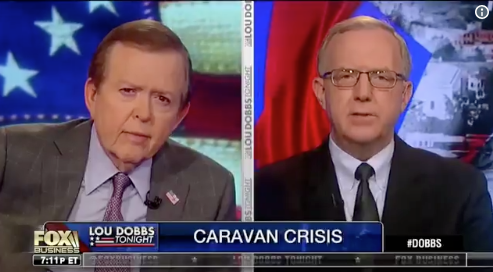Tucker’s Putin Envy
There was a part of the Global Threats Report presented to both the Senate and House Intelligence Committees last week that deserves more attention. In the middle of the section on Russia’s influence operations, the report predicted that Russia will “try to strengthen ties to U.S. persons in the media and politics in hopes of developing vectors for future influence operations.”
It is the judgment of the intelligence community, per the report, that Russia is trying to cultivate “US persons in the media and politics” as part of its foundation for future influence operations.
Russia presents one of the most serious foreign influence threats to the United States, because it uses its intelligence services, proxies, and wide-ranging influence tools to try to divide Western alliances and increase its sway around the world, while attempting to undermine U.S. global standing, sow discord inside the United States, and influence U.S. voters and decisionmaking. Moscow probably will build on these approaches to try to undermine the United States as opportunities arise. Russia and its influence actors are adept at capitalizing on current events in the United States to push Moscow-friendly positions to Western audiences. Russian officials, including Putin himself, and influence actors routinely inject themselves into contentious U.S. issues, even if that causes the Kremlin to take a public stand on U.S. domestic political matters.
- Moscow views U.S. elections as opportunities for malign influence as part of its larger foreign policy strategy. Moscow has conducted influence operations against U.S. elections for decades, including as recently as the U.S. midterm elections in 2022. It will try to strengthen ties to U.S. persons in the media and politics in hopes of developing vectors for future influence operations.
- Russia’s influence actors have adapted their efforts to increasingly hide their hand, laundering their preferred messaging through a vast ecosystem of Russian proxy websites, individuals, and organizations that appear to be independent news sources. Moscow seeds original stories or amplifies preexisting popular or divisive discourse using a network of state media, proxy, and social media influence actors and then intensifies that content to further penetrate the Western information environment. These activities can include disseminating false content and amplifying information perceived as beneficial to Russian influence efforts or conspiracy theories. [italicized bold original, underline my emphasis]
This is not new news. Obviously Russia has been cultivating both journalists and politicians in recent years, often by inviting them for big shindigs in Russia, after which, over the course of years, they come to spout more and more Russian propaganda uncritically.
It’s is noteworthy that the IC stuck this detail amid discussions about election interference and Ukraine mobilization, because Russia has had renewed success of late getting entertainers and politicians to magnify inflammatory and often false claims about Ukraine.
The judgement came out the same week that Tucker Carlson (whose Ukraine invasion anniversary special was breathtaking even by his standards of propaganda) provided more details of the time, in summer 2021, he was informed that the NSA had discovered his back channel contacts to Putin.
The story starts when Tucker squeals that he’s envious of the podcasters because they got to go to Russia, but he might be arrested if he went. Throughout the show, his interviewers operate on the assumption that Russia is the threat to Tucker, but he suggests State or FBI is.
Tucker: Now I’m envious.
[snip]
Full Send: But everyone told us not to go obviously, but. We knew we were with good people. So after that, it was all good, but.
Tucker: Oh, I want to go. I’ve never been there!
Full Send: You feel it though, it is real scary. There’s like military checkpoints.
Tucker: Oh yeah!
Full Send: It’s … it’s serious shit.
Full Send 2: Would you have gone with him or no?
Tucker: I can’t go to Russia. I honestly think I would be arrested.
Full Send: Yeah, they get you.
Tucker: Which is outrageous because, I’m a journalist, and I’ve been all over the world. I feel like I’ve been everywhere except Russia. And Russia is a combatant in a war that’s changing the world, and like I should go see it. And I was planning it and then I got stopped by the US government from doing it.
Full Send: Oh, you were gonna go? What were going to do?
Tucker: Interview Putin. Why wouldn’t I?
Full Send: You had it set up? Damn!
Tucker: I was working on it and then they broke into my text messages — the NSA broke into my Signal account, which I didn’t know they could do —
Full Send: Oh so Signal’s not even safe!
Tucker: Signal is not safe. It’s not safe. Signal’s not safe.
Full Send: I know people think WhatsApp’s safe.
Tucker: WhatsApp?!?! WhatsApp is not — you know what’s safe? And ask any mafia Don. Park your car in front of the liquor store. Leave your phone in the vehicle, in your Caprice Classic, and walk out behind the liquor store, in the vacant lot back there with the WINOs, to talk to the person you want to talk to.
Full Send 2: How many times have you done that?
Tucker: Zero. Cause I’m like lazy. I’m like whoa! And I’m — actually I always say to myself, I’m not hiding anything. I don’t have a secret life. I’m pretty upfront. And some people like it and some people don’t. Of course, but, I’m not hiding anything. But I was definitely hiding my plan to go interview Putin, just because it’s an interview. It’s no one’s business.
Full Send 2: So how did that happen? How do you know the NSA broke into your Signal?
Tucker: Because they admitted it.
Full Send: Really?
Tucker: Oh yeah!
Full Send: Can you tell us about it? Like how did you find out?
Tucker: I got a call from somebody in Washington who’s — who would know. Just trust me. So I went up there for another reason. But this person said, you know, you going to come to Washington anytime soon? This was a year and a half ago, and I was like, yeah, actually I’m going to be up in a week. He’s like, meet me Sunday morning. So weird. Like, who does that? Just text me, you know what I mean? Just text me. No. So I go and this person’s like — and this is someone who would know — Um, are you planning a trip to go see Putin? This was the summer before the war started. I was like, how would you know that? I haven’t told anybody that, I mean, anybody. Not my brother, not my wife, nobody. Just because, you know, it’s one of a million things you’re working on, but that was one of them. I want to go interview Putin. Why wouldn’t I want to go interview Putin?
Full Send 2: Of course.
Tucker: I want to interview Xi, I want to interview everybody. Right? That’s kind of my job.
Full Send: We want to get Kim Jong Un on here one day.
Tucker: Of course! Of course! We met him.
Full Send: You did? We gotta talk about that. Holy shit.
Tucker: Yup. Super interesting. But anyway, um, how would you know that? Because NSA pulled your texts with this other person you were texting. How did you know that? And so I immediately, I was intimidated, I’m embarrassed to admit, but I was, I was completely freaked out by it. I called a US Senator, who I know — not that well, but it seems like a trustworthy person, and I told him the story, I just want to tell you this, and then I went on TV on Monday and I’m like this happened. And so they had — Congress asked NSA and NSA’s like, yes we did this, but for good reason. What would be a good reason to read my — you know, what? But the head of NSA, it’s fine, cause everyone’s in on it, Republicans and Democrats are all in on it. And by it I mean the assumption that there’s no privacy whatsoever, that they have a right to know everything you’re saying and thinking,
Full Send: That shit’s scary.
Tucker: And that’s just not a right as far as I’m concerned. By the way, if you have no privacy you have no freedom. [my emphasis]
Parts of Tucker’s commentary provides more detail on the incident than previous reporting did, which I covered here and here. As Jonathan Swan reported, the IC collected communications showing a back channel effort to set up a meeting with Putin.
Tucker Carlson was talking to U.S.-based Kremlin intermediaries about setting up an interview with Vladimir Putin shortly before the Fox News host accused the National Security Agency of spying on him, sources familiar with the conversations tell Axios.
[snip]
The intrigue: Two sources familiar with Carlson’s communications said his two Kremlin intermediaries live in the United States, but the sources could not confirm whether both are American citizens or whether both were on U.S. soil at the time they communicated with Carlson.
- This is relevant because if one of them was a foreign national and on foreign soil during the communications, the U.S. government wouldn’t necessarily have had to seek approval to monitor their communications.
On Maria Bartiromo’s show in 2021, Tucker pointed to what was undoubtedly reporting done in the wake of his initial story — quite likely Swan’s own story (indeed, Tucker could well be one of Swan’s two sources) — and claimed it was proof the NSA was leaking information about him.
In the Bartiromo appearance, Tucker spoke in terms of a single email arranging an imminent trip to Russia.
In last week’s podcast, in addition to reiterating that Tucker is not trying to hide anything but oh yeah he was trying to hide his back channel to Putin, even from his spouse, Tucker adds two details: After he learned about it, he reached out to a (male) Senator to look into it, and the communications obtained include Signal texts, not just a single email.
In the past, I had suggested that Tucker’s tipster might be a member of Congress — a Gang of Eight member like Devin Nunes or Kevin McCarthy — or someone close to them (like Kash Patel). The fact that Tucker called a Senator in response (then Chair of the Senate Intelligence Committee Marco Rubio would make sense given the details he provides), and not someone he was closer to like Nunes, makes it more likely his initial tipster had a tie to the House. The focus on the Senate response may suggest this came up again in the Global Threats hearing, during the closed session.
The detail that, per Tucker, in addition to the email he sent about arranging a then-imminent trip to Russia, they also got Signal texts is more interesting, but it doesn’t mean he was the target or that they broke into his phone.
It does suggest that there could have been two different tracks going on: the discussion, over email, about a trip to Russia, one his producer knew about, and another more sensitive discussion going on via Signal.
We do know, however, that Tucker hasn’t hidden past interview preparation. Indeed, his outreach to Viktor Orbán was quite overt and gleeful. So his explanations about why he would want to hide preparation for a Putin interview don’t hold up.
Remember: When Tucker sent his now former investigative producer to try to FOIA this information from NSA (via a FOIA that was guaranteed to fail), he asked for 30 months of data, going back to January 1, 2019. That’s more than a single email to set up a meeting with Putin.
Rather than taking this as a tip that the back channels via which he was (at least) trying to set up a meeting with Putin are considered — even by Republican Senators — legitimate intelligence targets, possibly Russian spies, Tucker has instead spun up conspiracy theories. And that has, in turn, led him to suggest he faces a bigger threat from the US State Department than he would from Russian military checkpoints.
Update: On Twitter, MD suggested that Rand Paul may have been the Senator Tucker approached, given that he wrote a letter to General Nakasone. It’s an interesting possibility, especially given Russia’s cultivation of Rand and his father as well as the suggestion that whatever Senator he approached was ultimately satisfied with the explanation.



